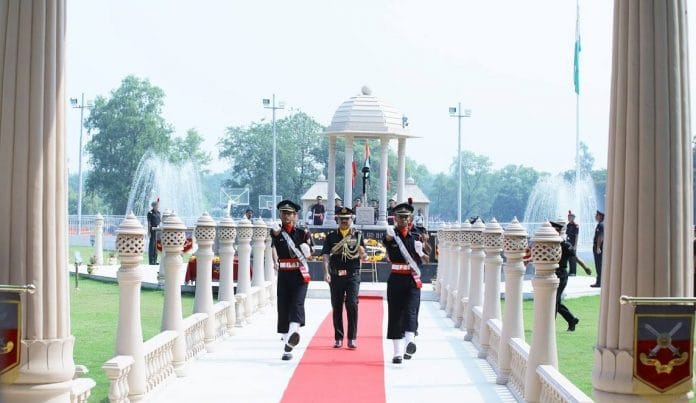Uniform Corner is a special series of articles written by serving and retired security personnel.
A retired air force officer writes about a generation that has not seen a war and does not know how to respect those who serve in the armed forces.
As I waited my turn to register a property sale at one of the crowded sub-registrar’s offices in suburban Bangalore a few years ago, I noticed a harassed and yet dignified gentleman with a crew cut waiting his turn ahead of me.
As we waited, a number of sale deeds jumped the line to reach the clerk. The gentleman with a crew cut protested in chaste Kannada that he was in the line for the entire duration of the previous day without getting a chance to register the sale. He went on to add that he was a Subedar from the Indian Army and that he had a train to catch in four hours. He said he had to get this sale through to pay a large installment for a house he was buying. He pleaded with the clerk to show some respect for the armed forces and that he had to catch a train to Jammu.
To my utter horror, not only was there no empathy from the clerk, but others in the line said: ‘So what if you are from the army, we too are doing our jobs – so what is so special about you’. A callow broker added: ‘Go to Punjab or Rajasthan and you can throw around your army rank. Here you are like all of us.’
When I spoke against their insensitive remarks, the Subedar said, “Chodo Saab yahaan koi izzat nahin karta hai (Drop it sir, no one respects us here).” But I charged into the Sub-Registrar’s office. “Who do you think you are, Sir,” he asked me. When I told him that I was an Air Vice Marshal from the Indian Air Force, he did not care. Then I told him that I would call a friend who was a senior police officer and showed him my identity card. He asked: “Is it your problem or his?” pointing to the Subedar.
I replied, “That does not matter because your staff is very insensitive to the requirements of a soldier who belongs to your state; his family lives here while he serves in areas where there is daily risk to his life.”
“What risk sir,” droned the Sub-Registrar. “He is only doing his job.”
The Subedar managed to finish his sale on time, thanks to a nod to the clerk from the supervisor. Bangalore is no exception. It happens in Mumbai, Delhi, Chennai, Kolkata, and in rural areas of Bihar, U.P too.
While officers manage to plan their property and financial affairs well, the Junior Commissioned officers struggle, primarily because of an insensitive cadre of clerks, administrators and policemen. Whenever these men go back home, the message they hear is: “You may be powerful when you wield your weapon on the borders, but here, you are part of the same feudal system with its caste equations and culture of ‘Jugaad’.”
But senior officers tell me that whenever matters of financial and property exploitation related to service personnel are brought to the notice of young IAS and IPS officers at the SP and Collector level, they go out of their way to help. But it is not enough.
The creeping ‘urban callousness’ towards the armed forces is a recent trend. Aggressive young professionals, particularly in the service sector, with little or no knowledge of the armed forces, and without any kin in uniform, show scant respect. A polite word from the employees of a civil hospital to a pregnant lady at a civil hospital with a husband serving on a field posting or a personal touch to attend to the widow of a deceased war veteran at the bank — these are but small ways to tell the armed forces that you care. Vijay Divas, Kargil Divas, Centenary celebrations of World War I are fine. Some journalists may highlight the travails of the Indian soldier on the icy heights of Siachen, or ask mothers what it means to come back to Kargil and Dras every year to commemorate the sacrifice of their sons. There are some government and service initiatives to look after such issues too.
But these are times when a whole generation or two may never see a war that mobilises and electrifies a nation – the last time that happened was not during Kargil, but as far back as in 1971. While corporates churn out billion dollar deals, and the Volkswagens and Mercedes roll out their luxury cars, the armed forces are not only on a lonely vigil on our land, sea and aerial frontiers, but also engaged in numerous daily skirmishes and battles in what is commonly known as insurgencies and proxy wars. Though many of these companies have initiatives that support the armed forces, a little more respect, acknowledgement and inclusiveness from the society at large can do wonders for the morale of our armed forces.
The author is a recently retired Air Vice Marshal from the Indian Air Force and author of ‘India’s Wars: A Military History 1947-1971.’






